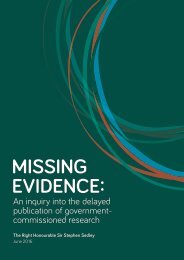INSIGHT & INSPIRATION FROM APHA’S 2012 MIDYEAR MEETING
INSIGHT & INSPIRATION FROM APHA’S 2012 MIDYEAR MEETING
INSIGHT & INSPIRATION FROM APHA’S 2012 MIDYEAR MEETING
You also want an ePaper? Increase the reach of your titles
YUMPU automatically turns print PDFs into web optimized ePapers that Google loves.
9<br />
Survive All In This Friends Prevention, Strategies<br />
& Thrive Together For Health Opportunity & Equity for Health<br />
The second area that’s helping Maryland do more with less also involves hospitals — specifically,<br />
leveraging new ACA-related financial incentives aimed at improving health care delivery<br />
to strengthen community-based care. For example, Phillips said, there’s a lot of pressure on<br />
hospitals to avoid preventable readmissions and better manage services for high-cost health<br />
care users. In turn, hospitals are looking toward community partners, such as public health<br />
departments, to help empower residents with the tools and services they need to stay healthy<br />
at home and they’re providing the financial support to help make it happen. Phillips noted that<br />
it’s a tremendous opportunity to illustrate public health’s critical role in curbing health care<br />
spending.<br />
Lastly, Phillips turned to technology, which she predicted would help “advance public health in<br />
ways we haven’t even imagined.” Maryland is home to a robust health information exchange,<br />
with all 46 acute care hospitals signed on and sending in data. And while the data flowing<br />
through the exchange is certainly a boon for the clinical treatment of patients, its potential to<br />
enhance public health surveillance and intervention is “huge — it’s almost unthinkable,” Phillips<br />
told attendees. So, with funding from a private foundation, the Maryland health department<br />
launched the Maryland Health Data Innovation Contest, calling on people to submit innovative<br />
ideas on using the exchange data to address public health challenges. The winner, who<br />
received a $5,000 prize and worked at the Maryland Poison Center, proposed marrying data<br />
from the medical examiner on overdose fatalities with poison control center data on overdose<br />
fatalities and near-misses. The combined data can help public health workers conduct needs<br />
assessments and better measure the impact of interventions. Maryland’s health department<br />
continues to host a website where people can continue the brainstorming process.<br />
“We see the role of public health at the state level as a convener of good ideas,” Phillips said.<br />
From session 2001/2006, All In This Together: Public Health Community Benefit, June 27



